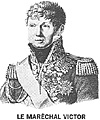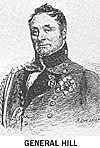This section is designed to provide a guide to the abilities of the various formation commanders in order to give those of you with command rating rules some idea of their capabilities. In many cases, there is insufficient data readily available to provide a reasoned assessment; in these cases, a rather arbitrary classification, based on performance at Talavera (27th/28th July) is given in brackets after the general's name in the orbats:
French
 1. Claude Victor-Perrin Duc de Belluno; C-i-C - I Corps
1. Claude Victor-Perrin Duc de Belluno; C-i-C - I Corps
A mediocre corps commander, inclined to be overconfident or uncertain, depending on the circumstances. Very good at the Battle of Medellin (March 1809), where he defeated Cuesta, very bad at Barossa (March 1811) where Gen.Graham beat him with a force considerably weaker in numbers. Chose and occupied his ground for this battle effectively but stayed for far too long after learning of the Allied advance of 22nd July.
2. Gen. Horace Frangois Bastien Sebastiani, Comte de la Porta.
3. M. Latour-Maubourg
One of the best Cavalry Corps commanders of the war. Less dash and ban than a Murat but with more imagination than a Kellermann. Thorough, competent and well-regarded by both subordinates and superiors. Excellent.
Spanish
1. Don Gregorio de la Cuesta
Old, obstinate, ill and paranoid. He believed (possibly with some reason) that Venegas was trying to oust him from overall command. Similarly concerned over Wellesley's rule (there had been a suggestion that the British commander be appointed C-i-C over British, Portuguese & Spanish armies) but with no real cause. Ridden over by his routing cavalry at Medellin, he went everywhere in a carriage. He retired, after a stroke in August 1809 dying in 1812 in Mallorca. Incompetent.
2. Jose Zayas
Probably the best Spanish divisional general of the early period of the war (he was elected to the Supreme Junta in 1812) he commanded, on more than one occasion, the only body of Spanish infantry to retain good discipline in defeat through-out the retreat and, at Albuera (May 1811), commanded the Spanish 4th Div who held a French division, retaining formation and order despite heavy casualties & being fired on from the rear, by the British 2nd Div. Excellent.
British
 1. Sir Arthur Wellesley
1. Sir Arthur Wellesley
Thorough, prudent, a brilliant reader of terrain, strategically sound and tactically excellent, Wellesley was the complete Army commander. Not perhaps with the Emperor's brilliance but without Napoleon's late career tendency to delegate too completely and then recriminate after the event. Superb.
2. Sir Roland Hill
Reliable, popular (with his men - they called him "Daddy Hill"), competent but not inspired. Good.
Casalegas 23rd July, 1809
- Historical Background
The Generals
Orders of Battle: French
Orders of Battle: British
Orders of Battle: Spanish
Wargaming the Battle
Back to Battlefields Vol. 1 Issue 1 Table of Contents
Back to Battlefields List of Issues
Back to Master Magazine List
© Copyright 1995 by Partizan Press.
This article appears in MagWeb.com (Magazine Web) on the Internet World Wide Web.
Other articles from military history and related magazines are available at http://www.magweb.com